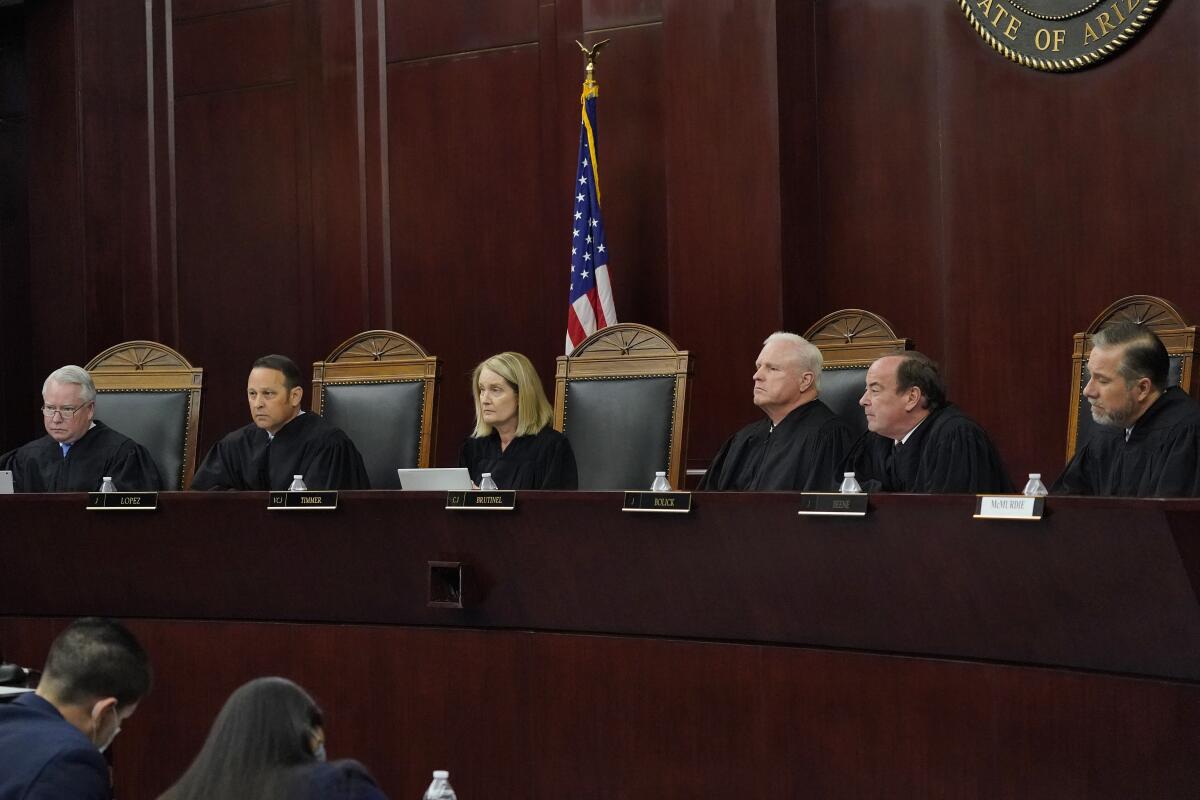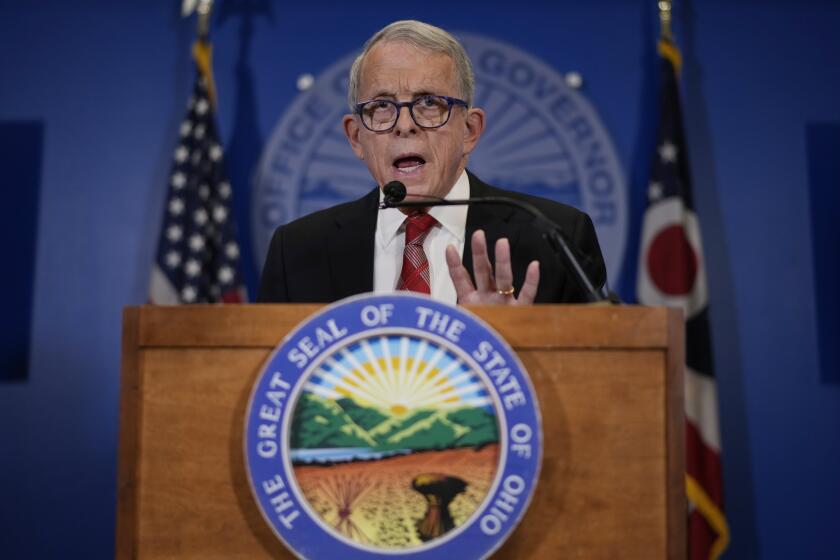Abortion debate creates ‘new era’ for state supreme court races in 2024

CHICAGO — The 2024 elections will be dominated by the presidential contest and the battle for control of Congress, but another series of races is shaping up to be just as consequential.
Crucial battles over abortion, gerrymandering, voting rights and other issues will take center stage in next year’s elections for state supreme court seats — 80 of them in 33 states.
The races have emerged as some of the most hotly contested and costliest contests on the ballot since the U.S. Supreme Court overturned Roe vs. Wade, eliminating the constitutional right to an abortion. The decision shifted the abortion debate to states, creating a “new era” in state supreme court elections, said Douglas Keith, senior counsel in the judiciary program at the Brennan Center for Justice, which tracks spending in judicial races.
“We have seen attention on state supreme court elections like never before and money in these races like never before,” Keith said.
Gov. Mike DeWine broke from his party, vetoing a bill that sought to ban gender-affirming care and transgender participation in girls and women’s sports.
Heated court races in Wisconsin and Pennsylvania in 2023 handed victories to Democrats and saw tens of millions of dollars in TV ads, offering a preview of 2024. They’re also prompting groups to consider investing in states they would not previously have considered.
At least 38 lawsuits have been filed challenging abortion bans in 23 states, according to the Brennan Center. Many of those are expected to end up before state supreme courts.
The ACLU is watching cases challenging abortion restrictions in Wyoming, Kentucky, Ohio, Utah, Florida, Nevada, Arizona, Nebraska, Georgia and Montana.
“After Roe v. Wade was overturned, we had to turn to state courts and state constitutions as the critical backstop to protecting access to abortion,” said Brigitte Amiri, deputy director at the ACLU’s Reproductive Freedom Project. “And the stakes are unbelievably high in each of these cases in each of these states.”
The ACLU was among major spenders on behalf of Democrats in this year’s state supreme court contests in Wisconsin and Pennsylvania.
Another big player in recent court races has been the Republican State Leadership Committee, which has said its focus is mainly on redistricting, or the drawing of political district boundaries. The group called state supreme courts the “last line of defense against far-left national groups,” but didn’t say how much it intends to spend on next year’s races or which states it’s focusing on.
In Ohio, Democrats are expected to cast state supreme court races as an extension of the November election in which voters enshrined the right to abortion in the state constitution. The state has more than 30 abortion restrictions in place that could be challenged now that the amendment has passed.
“The state supreme court is going to be the ultimate arbiter of the meaning of the new constitutional amendment that the people voted for and organized around,” said Jessie Hill, law professor at Case Western Reserve University and a consultant for Ohioans United for Reproductive Rights. “That is a huge amount of power.”
With three seats up for a vote and a current Republican majority of 4 to 3, Democrats have an opportunity to flip the majority of the court while Republicans will try to expand their control. Hill said the “very high-stakes election” will serve as another test of the salience of the abortion issue in turning out voters.
“We saw an incredible number of voters come out to vote on that amendment and an incredible amount of investment in those campaigns,” Hill added. “I think we’ll see a similar attention and investment in Ohio come next year.”
Redistricting also is likely to be a main focus in the state’s supreme court races, given the court will have realigned politically since it issued a series of rulings finding Ohio’s congressional and legislative maps unconstitutionally gerrymandered to favor Republicans, said David Niven, political science professor at the University of Cincinnati. He expects millions of dollars to be spent on those campaigns.
“There’s often little conversation about these races, but they are just so utterly consequential in very tangible, practical ways that touch voters’ everyday lives,” he said.
Pending legislative and congressional redistricting cases also could play a role in North Carolina.
Republicans in North Carolina are looking to expand their majority two years after the court flipped from Democratic control in the 2022 election. That flip to a 5-2 GOP majority led to dramatic reversals in 2023 on rulings made by the previous court, which had struck down a 2018 photo voter identification law as well as district maps for the General Assembly and the state’s congressional delegation.
Groups on both sides also are expected to focus on Michigan, where Democrats hold a 4-3 majority on the state Supreme Court. Candidates run without political affiliations listed on the ballot, though they’re nominated by political parties.
Two incumbents — one Democrat, one Republican — will be up for election in 2024. The court recently kept former President Trump on the state’s ballot, denying a liberal group’s request to kick him off. It is currently weighing a high-profile case over a Republican legislative maneuver that gutted a minimum wage hike backed by voters.
In Wisconsin, abortion played a dominant role in the 2023 court race, with Democrats flipping the court to a 4-3 majority in a campaign that shattered previous national records for spending in state supreme court elections.
Liberal-leaning Justice Janet Protasiewicz defeated former Justice Dan Kelly, who previously worked for Republicans and had support from the state’s leading anti-abortion groups.
Protasiewicz was targeted with impeachment threats this year over comments she made on the campaign trail about redistricting as Republicans argued she had prejudged what then was an expected case on the state’s heavily gerrymandered state legislative districts. Experts say the controversy is an example of how more money and attention have changed the dynamics of many state supreme court races to be increasingly partisan.
Democrats in Pennsylvania added to their majority on the court after a race with tens of millions of dollars in spending. Democrat Dan McCaffery won after positioning himself as a strong defender of abortion rights.
It remains to be seen whether abortion rights will play a factor in states where party control isn’t at stake. That includes Arkansas, where the court is expected to maintain its 4-3 conservative majority. The seats up next year include the chief justice position, which has drawn three sitting justices.
A fight over abortion could wind up before the court, with a group trying to put a measure on the ballot next year that would scale back a state ban on the procedure that took effect once Roe was overturned.
Abortion rights supporters also aren’t writing off long shot states such as Texas and its all-Republican high court, which rejected the request from a pregnant woman whose fetus had a fatal condition to be exempted from the state’s strict abortion ban.
In Montana, Republicans have spent huge sums to try to push the court in a more conservative direction. The liberal-leaning court is expected to hear cases related to restrictions on transgender youth and abortion. A landmark climate change case also is pending before the court, which will have two of its seven seats up for election.
Jeremiah Lynch, a former federal magistrate running for the open chief justice position, has cast himself as a defender of the court’s independence and has warned voters to expect a barrage of negative advertising. Cory Swanson, a county attorney also running for the post, announced his bid on a conservative talk show and recently vowed to weed out any “radicalized” applicants for law clerks in response to antisemitism on college campuses.
In West Virginia, where conservatives have a current 5-4 majority on the court and two seats will be up for grabs, GOP chair Elgine McArdle said Republicans aim to focus more on judicial races than in years past.
“One area the state party has never really engaged much in is nonpartisan races, including the judicial races,” McArdle said. “That won’t be the case this time around.”
More to Read
Sign up for Essential California
The most important California stories and recommendations in your inbox every morning.
You may occasionally receive promotional content from the Los Angeles Times.











